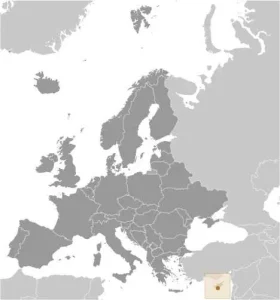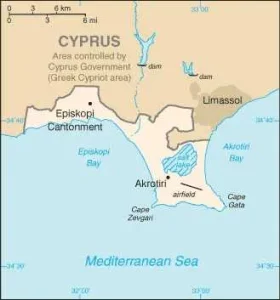In the eastern Mediterranean, the Akrotiri Sovereign Base Area, also known as the Western Sovereign Base Area, emerges as a unique geopolitical entity. It was established under the 1960 Treaty of Establishment, which also led to the creation of the independent Republic of Cyprus. As a result of this treaty, the United Kingdom retained full sovereignty and jurisdiction over two areas totaling almost 254 square kilometers, with Akrotiri being the southernmost and smaller of the two. This British Overseas Territory, encompassing a mix of military installations, fertile wetlands, and ancient history, stands out for its strategic significance and rich ecological diversity. Notably, the Akrotiri Salt Lake, a significant site for migratory birds, including flamingos, adds to its environmental importance, making it a fascinating blend of natural beauty and historical intrigue in a region steeped in ancient and modern history.
Background
Akrotiri, part of the Sovereign Base Areas of Akrotiri and Dhekelia, was established as a British Overseas Territory 1960 under the Treaty of Establishment. This treaty created the independent Republic of Cyprus, with the UK retaining sovereignty and jurisdiction over Akrotiri and Dhekelia for military purposes. Located on the southwestern coast of Cyprus, Akrotiri is also called the Western Sovereign Base Area.
Overview
Akrotiri is a key strategic location for the UK, primarily serving as a site for military bases. The area covers almost 254 square kilometers, including a salt lake and wetlands. Its location in the Eastern Mediterranean offers a crucial advantage for both military and geopolitical purposes.
Official Name: Akrotiri Sovereign Base Area
Date of Formation: 1960 (Treaty of Establishment)
Total Area: 123 square kilometers
Languages: English, Greek
Government: Administered as a British Overseas Territory
Currency: Euro (EUR)
Akrotiri Google Maps
Geography
Akrotiri, situated in the Eastern Mediterranean on the southwest coast of Cyprus, encompasses a unique and ecologically significant landscape. Covering a total area of about 123 square kilometers, it is approximately 0.7 times the size of Washington, D.C. This British Overseas Territory, though small in size, plays a crucial role in regional ecology and biodiversity.
- Geographical Significance: Akrotiri’s terrain is distinguished by its peninsula, featuring a prominent salt lake – the Akrotiri Salt Lake. This salt lake is one of the most important wetlands in the Eastern Mediterranean and serves as a critical habitat for migratory birds, including flamingos and other waterfowl. The salt lake and surrounding wetland areas contribute significantly to the region’s biodiversity.
- Climate: The climate in Akrotiri, like much of Cyprus, is typically Mediterranean. This means it experiences hot, dry summers and mild, wet winters. The average summer temperature ranges from 30°C to 35°C (86°F to 95°F), while in winter, it averages around 10°C to 15°C (50°F to 59°F). The region receives most of its rainfall during the winter months, with December being the wettest month.
- Biodiversity: The wetland areas around the Akrotiri Salt Lake are of immense ecological importance. They provide a sanctuary for numerous bird species, particularly during the migratory seasons. The area is recognized as a vital stopover for birds migrating between Africa and Europe, hosting species such as the Greater Flamingo. The site is also home to various plant species adapted to the saline environment.
- Environmental Protection: Due to its ecological importance, parts of Akrotiri have been designated as a Community Importance and Special Protection Area site under the European Union’s Natura 2000 network. Conservation efforts focus on preserving the habitat for its avian population and maintaining the natural balance of the wetland ecosystem.
- Human Impact and Conservation Challenges: While Akrotiri’s environment is relatively undisturbed due to limited urban development, it faces environmental pressures typical of Mediterranean regions. These include water scarcity, habitat loss, and the impact of climate change. Conservation efforts are crucial in maintaining the balance of this delicate ecosystem.
Akrotiri’s unique geographic and ecological characteristics make it a significant area for environmental studies and conservation efforts in the Mediterranean. Its role as a haven for migratory birds and its distinctive wetland ecosystem highlights the importance of small territories in contributing to global biodiversity and ecological health.
Climate
While relatively small in area, Akrotiri boasts a significant ecological and climatic profile that greatly influences its natural landscape and biodiversity. The temperate Mediterranean climate it experiences is crucial for maintaining the unique ecosystem, particularly within the wetlands and surrounding areas.
- Climate Characteristics: Akrotiri’s Mediterranean climate is marked by hot, dry summers and mild, wet winters. Summer temperatures often soar above 30°C (86°F), creating arid conditions typical of Mediterranean climates. This heat is moderated slightly by sea breezes from the Mediterranean. In contrast, winters are cooler and more humid, with temperatures ranging between 10°C and 15°C (50°F – 59°F). Rainfall occurs mainly in winter, providing essential moisture to the region’s flora and fauna.
- Impact on Ecosystem: This climatic pattern is vital for the wetlands in Akrotiri, particularly the Salt Lake. The seasonal variations in temperature and precipitation support a range of biomes, from semi-arid habitats to aquatic ecosystems. The wetlands become a critical breeding ground for various bird species during the winter when the lake fills with water. In the summer, as the lake dries up, it leaves behind salt deposits that are characteristic of such environments.
- Biodiversity: The climate supports a rich biodiversity, especially in migratory bird species. Akrotiri’s wetlands are an important stopover for birds migrating between Africa and Europe. Species such as flamingos are regular visitors attracted by the brackish waters of Salt Lake, which are rich in food sources like brine shrimp.
- Surrounding Region and Climate Influence: Akrotiri is located in the Eastern Mediterranean region on the southwest coast of Cyprus. Cyprus, the third largest and third most populous island in the Mediterranean, experiences a similar climate, which shapes its landscapes and ecosystems. The island is known for its extensive coastline, mountain ranges, and fertile plains.
- Environmental Challenges: While conducive to rich biodiversity, the Mediterranean climate also poses challenges such as water scarcity and drought risk. These challenges are exacerbated by global climate change, which can lead to increased temperatures and altered precipitation patterns, potentially impacting the delicate balance of the wetland ecosystems.
The climate of Akrotiri plays a fundamental role in sustaining its unique ecological systems. Understanding and preserving this delicate balance is crucial, especially in the face of environmental challenges posed by climate change. The region’s climate and ecological richness also make it an important area for conservation and study within the Mediterranean basin.
Population
As of 2020, approximately 18,195 people reside in the Sovereign Base Areas of Akrotiri and Dhekelia, including Cypriot citizens, service personnel from the UK, and their dependents.
Languages
The primary languages spoken in Akrotiri are English and Greek, reflecting the region’s British administration and geographical location within Cyprus.
Government
Akrotiri is administered as a British Overseas Territory. It is governed by an administrator who reports to the British Ministry of Defense. The territory functions under a special form of UK overseas territory administration, balancing military needs with local civil administration.
Economy and Currency
The economy in Akrotiri is primarily driven by its function as a military base. The territory uses the Euro (EUR) for its transactions, aligning with Cyprus’s currency.
Environmental Issues
Environmental concerns in Akrotiri include hunting around the salt lake and the conservation of its unique ecosystem. The salt lake area is a breeding ground for loggerhead and green turtles and hosts the only remaining colony of griffon vultures on the base.
Legal System
The legal system in Akrotiri aims to align as closely as possible with the laws of the Republic of Cyprus. The Sovereign Base Area Administration has its court system for civil and criminal matters.
Military Importance
Akrotiri holds significant military importance for the UK. It includes a full Royal Air Force base and serves as the headquarters for British Forces Cyprus.
Did You Know?
- A Vital Bird Sanctuary: Akrotiri’s Salt Lake is a critical sanctuary for migratory birds, especially flamingos. The lake becomes a temporary home to thousands of these vibrant birds each winter, creating a spectacular sight.
- Salt Lake Phenomenon: The Akrotiri Salt Lake dries up in the summer, leaving a vast expanse of salt. This natural process has been a source of salt since antiquity and continues to be a striking feature of the landscape.
- British Overseas Territory: Despite its location on the southwest coast of Cyprus, Akrotiri is actually a British Overseas Territory. This is a remnant of the British Empire’s extensive reach.
- Important Wetlands: The wetlands of Akrotiri are considered some of the most important in the Eastern Mediterranean. They support diverse wildlife and are crucial for the region’s ecological balance.
- Unique Ecosystem: The region’s temperate Mediterranean climate supports a unique ecosystem within its wetlands. This ecosystem is particularly adapted to seasonal changes, fluctuating between wet and dry periods.
- Archaeological Significance: The area around Akrotiri is rich in archaeological sites, reflecting its long history of human habitation. These include ancient settlements and artifacts that offer insights into the island’s past civilizations.
- Conservation Efforts: Akrotiri is part of the Natura 2000 network, a network of nature protection areas within the European Union. This designation underscores its importance for biodiversity and the need for its conservation.
- Cultural Blend: Cypriot and British influences in Akrotiri make it a unique blend of cultures. This is reflected in the local lifestyle, traditions, and even the cuisine.
- Tourist Attraction: While predominantly known for its military base and ecological significance, Akrotiri also attracts tourists. Visitors come to see the flamingos at Salt Lake, explore the archaeological sites, and experience its unique cultural blend.
- Strategic Location: Akrotiri’s strategic location in the Eastern Mediterranean has made it an important point for trade and military throughout history. Today, it continues to hold strategic significance.
These facts highlight Akrotiri’s unique blend of natural beauty, historical significance, and cultural diversity, making it a fascinating destination in the Eastern Mediterranean.
Many thanks for visiting and sharing this map & country information site!



